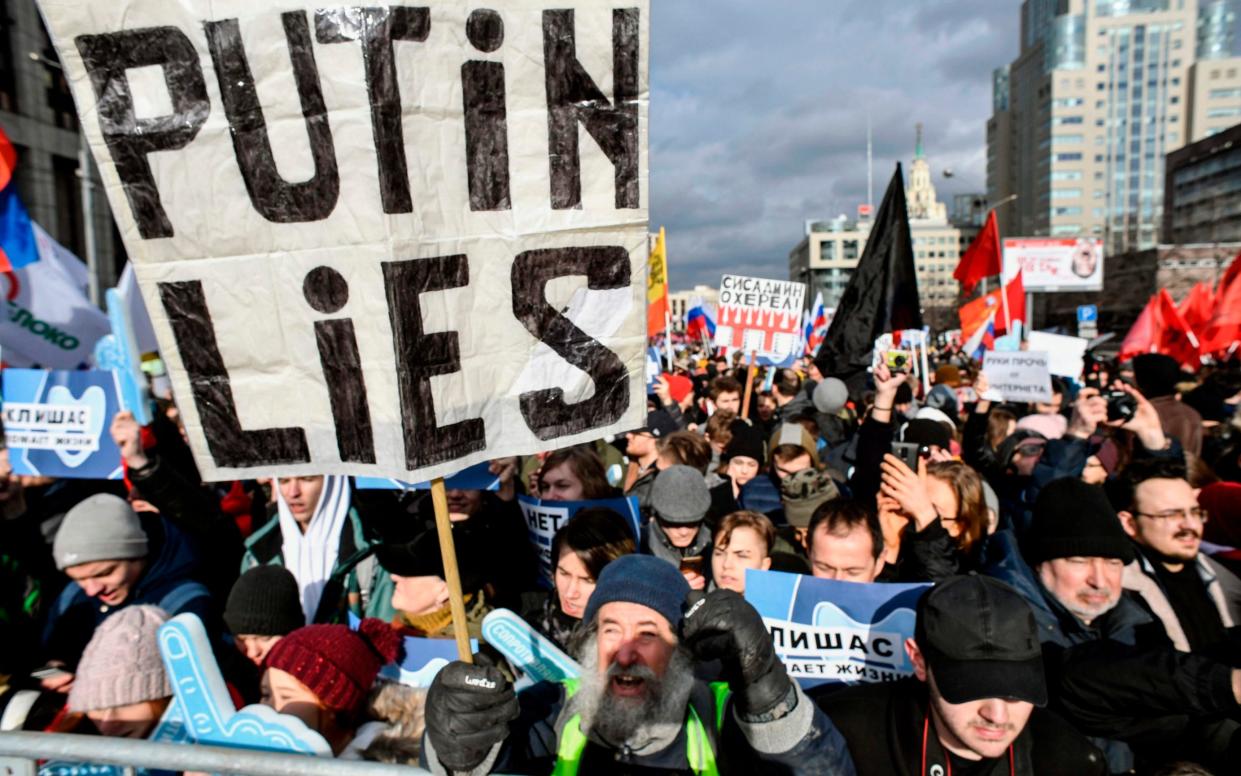The West should tear down Putin’s new digital Iron Curtain

- Oops!Something went wrong.Please try again later.
This week, the Kremlin continued pushing through some of the most repressive laws in its modern history.
On March 11, Putin signed into law a bill that bans media advertisers from working with “foreign agents” – a deliberately ambiguous term. It follows the government banning Virtual Private Networks (VPNs) earlier this month: tools that allow users to access blocked sites in Russia – including The Telegraph – while masking their location and identity.
It is the latest move by the Kremlin to strengthen Russia’s digital iron curtain descending over Russia’s 143 million people. But it is not the first. A 2017 attempt to ban VPNs did not stop Russians from accessing prohibited websites. In September 2023, a Russian polling outfit found that almost half of Russians would continue to use a VPN to access YouTube.
Rather than being symbolic of his strength, this digital iron curtain highlights Putin’s fear before Russia’s presidential election in March. A secure regime would never feel the need to implement such a stringent ban.
The renewed bans are part of a multiyear campaign to consolidate information control amid concerns that the costs of war in Ukraine could bolster domestic opposition. Readers will recall that in March 2022, Putin signed a law banning “fake news” so that calling the fighting in Ukraine a “war” rather than “special military operation” became a crime punishable by 15 years in prison.
Soon after, he shuttered what remained of Russia’s independent media and restricted Russians’ access to Instagram, Facebook, and Twitter. He has targeted social media influencers and activists with draconian sentences to deter those who develop too many followers or contradict regime statements. Only recently did Russia’s parliament endorse a bill to allow authorities to confiscate assets from people convicted of spreading “deliberately false information”.
Putin’s paranoia about the web, which he claims is a CIA project, is – in short – a decade-long project which continues at pace. Late last month, Russians even experienced mass internet outages as Russia apparently tested efforts to cut Russia off entirely from the World Wide Web in favor of a Russia-only intranet.
Again, no regime that is secure would dream of such measures. As such, the West should work harder to subvert them, just as it did during the Cold War.
For too long, the West assumed that the Internet was itself a liberating, democratising force. It made the same mistake with finance, engorging Russia and assuming that freedoms would come with it. But we now know that the Internet, like capitalism, can be a tool of oppression in the hands of a totalitarian regime.
So we must change strategy and be more proactive. In this regard, there is room for optimism. In 2023, protesters in Russia used anonymous accounts on social media to express dissent via coded language. Opposition to the Ukraine War has only grown since, with wives and mothers organising protests against the mobilisation of Russian men via “The Way Home” Telegram channel. Such protests continue. The West and Russians should, therefore, share instructions via Telegram or popular Russian social media sites like VK about how to access private services, mesh networks, or bypass censorship.
There is much understandable anxiety and pessimism around at the moment, but it is worth repeating that Putin is right to be fearful. The Soviet Union suffered 15,000 deaths and 54,000 wounded during its decade-long war in Afghanistan. That war, too, went in phases, with the Soviets sometimes in a stronger position, just as they are at the present moment in Ukraine. But it still led to enough internal agitation to set the Soviet Union down the path to collapse.
The Russian Army suffered similar casualties during the 1994-96 Chechen War, the ramifications of which undercut Russian President Boris Yeltsin and ultimately led to his resignation in favor of Putin. Independent estimates suggest the number of Russian dead or severely wounded in Ukraine now exceeds 300,000, a quarter of the Russian army. Those numbers present a moral danger to Putin’s control in the long run.
Putin cannot admit that he will not win the war in Ukraine on the battlefield. Nor does he want Russians to know the true cost of his folly. The United States and Europe might discuss and debate new aid packages and more weapons for Ukraine, but enabling Russians to recognise reality is just as important. It is time we did just that.
Dr Ivana Stradner is a Research Fellow at the Foundation for Defense of Democracies

